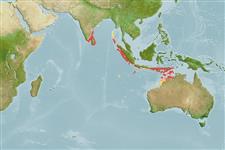>
Eupercaria/misc (Various families in series Eupercaria) >
Labridae (Wrasses) > Cheilininae
Etymology: Cirrhilabrus: Latin, cirrus = curl fringe + Greek, labros = furious (Ref. 45335); joanallenae: Named for Joan M. Allen.
Environment: milieu / climate zone / depth range / distribution range
Écologie
marin; profondeur 12 - 40 m (Ref. 48636). Tropical
Eastern Indian Ocean: Andaman Is., Sri Lanka and Sumatra, Indonesia.
Taille / Poids / Âge
Maturity: Lm ? range ? - ? cm
Max length : 8.5 cm TL mâle / non sexé; (Ref. 48636)
Description synthétique
Clés d'identification | Morphologie | Morphométrie
Épines dorsales (Total) : 11 - 12; Rayons mous dorsaux (Total) : 9; Épines anales: 3; Rayons mous anaux: 9; Vertèbres: 25. Color in life red or red-brown, white on ventral parts; females with 5 white stripes or horizontal rows of white spots on head and sides; males with black pelvic fins and blue caudal fin. Lateral line interrupted, dorsoanterior series of pores scales 14-15; straight peduncular part 6-8, not including a larger pored scale on the base of caudal fin. Median predorsal scales 5. A single scale row on cheek. First 2 dorsal spines in males elevated, forming an elongate pennant-like structure, its length, 0.7-0.8 in head. Caudal fin rounded in juveniles, females and small males; rhomboid in mature males. Pelvic fins of males long and club-shaped, 0.7 in HL (Ref. 44110).
A group of 10-15 individuals were sighted and observed on rubble bottom at the base of a moderate slope. Observed twice during late afternoon where males were chasing females and engaging in courtship displays in which dorsal and pelvic fins were fully erect (Ref. 44110). Often exported from Bali in the aquarium trade. Appears to be undescribed, closely related to C. rubriventralis from the Red Sea (Ref. 48636).
Life cycle and mating behavior
Maturité | Reproduction | Frai | Œufs | Fécondité | Larves
Distinct pairing during breeding (Ref. 205).
Allen, G.R., 2000. Description of a new wrasse (Pisces: Labridae: Cirrhilabrus) from northern Sumatra, Indonesia. aqua, J. Ichthyol. Aquat. Biol. 4(2):45-50. (Ref. 44110)
Statut dans la liste rouge de l'IUCN (Ref. 130435: Version 2024-1)
Menace pour l'homme
Harmless
Utilisations par l'homme
Outils
Articles particuliers
Télécharger en XML
Sources Internet
Estimates based on models
Preferred temperature (Ref.
123201): 28 - 29, mean 28.5 °C (based on 14 cells).
Phylogenetic diversity index (Ref.
82804): PD
50 = 0.5000 [Uniqueness, from 0.5 = low to 2.0 = high].
Bayesian length-weight: a=0.01585 (0.00700 - 0.03587), b=2.95 (2.76 - 3.14), in cm total length, based on LWR estimates for this (Sub)family-body shape (Ref.
93245).
Niveau trophique (Ref.
69278): 3.3 ±0.4 se; based on size and trophs of closest relatives
Résilience (Ref.
120179): Haut, temps minimum de doublement de population inférieur à 15 mois (Preliminary K or Fecundity.).
Fishing Vulnerability (Ref.
59153): Low vulnerability (10 of 100).
